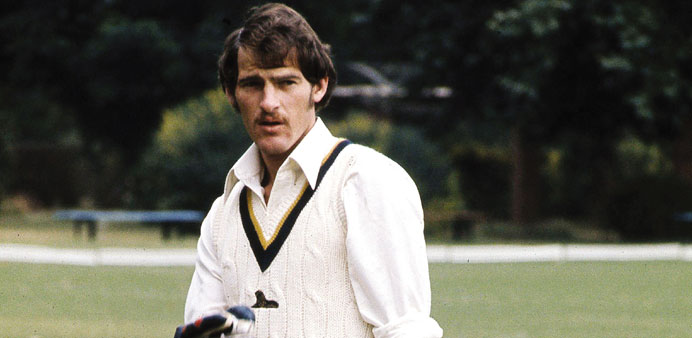An undated picture shows South African all-rounder Clive Rice before a practice session in Johannesburg. Rice, the first post-apartheid captain of South Africa, died yesterday aged 66, after suffering from a brain tumour. He played most of his cricket during South Africa’s 20-year isolation from the international game. (AFP)
AFP/Johannesburg
Clive Rice, the first post-apartheid captain of South Africa and a famed all-rounder, finally succumbed to an opponent he could not beat when he died yesterday, five days after his 66th birthday.
Rice, who had been suffering from a brain tumour and lung cancer, acknowledged in a recent interview that he was “in the departure lounge” but was determined to fight until the end. He underwent robotic radiation treatment for the brain tumour in Indian city Bangalore and said in March that he believed the doctors there had saved him from death after he had been told he couldn’t be treated in South Africa.
But he was admitted to a South African hospital two days ago, suffering from severe stomach pains, and a Cricket South Africa spokesman confirmed that Rice died early yesterday.
Throughout a 24-year first-class career, Rice was renowned as a tough competitor. He was selected for the Transvaal provincial team at the age of 20 and his potential as a fast bowling all-rounder was recognised two years later when he was selected for South Africa’s scheduled 1971-72 tour of Australia.
The tour did not take place because of opposition to the South African government’s apartheid policy and it was another 20 years before the country returned to official international cricket—with Rice, then 42, captaining a team which played three one-day internationals (ODIs) in India.
But he was controversially not included in South Africa’s team for the 1992 World Cup in Australia and New Zealand, with the selectors believing younger, more athletic players were needed for the big fields of Australia.
Ironically, it was because of Rice’s athleticism and potential on those same big fields that he had been picked as a promising youngster for the cancelled 1971-72 tour. Denied official international cricket, Rice’s exploits were limited to South African domestic cricket, the English county championship and Kerry Packer’s World Series Cricket—and 18 unofficial Tests for South Africa against ‘rebel’ touring teams between 1982 and 1987.
Rice’s career coincided with an era of notable all-rounders, including Ian Botham, Imran Khan, Kapil Dev, Richard Hadlee and fellow-South African Mike Procter. Former South African captain Ali Bacher said: “I have no doubt that given the opportunity to play regular Test cricket, Clive Rice would have been right up there with the best all-rounders in Test history.”
He was captain of the Transvaal ‘mean machine’ which dominated South Africa’s domestic competitions during the 1980s. It was a team packed with players of international standard, including South Africa’s Cricketer of the Century Graeme Pollock, and other stars such as Jimmy Cook, Vintcent van der Bijl and West Indians Alvin Kallicharan and Sylvester Clarke.
Rice was uncompromising, insisting on his team maintaining their highest standards against all opponents. “Don’t ever let them think they might be able to beat you because if they do it once, they’ll think they can do it again,” he once said.
He was appointed captain of English county Nottinghamshire in 1978 but was sacked after joining World Series Cricket. Rice went to court to force the county to retain him on the staff and a season and a half later he regained the captaincy.
Forming a match-winning partnership with New Zealander Hadlee, he led Nottinghamshire to victory in the county championship in 1981 -- their first title in 52 years.
In naming Rice as one of their 1981 Cricketers of the Year, the Wisden Almanack likened the combination of Rice and Hadlee to the great Nottinghamshire pair of Harold Larwood and Bill Voce. In 482 first-class matches he scored 26,331 runs at an average of 40.95 and took 930 wickets at an average of 22.49.
Former South Africa all-rounder Mike Procter, a contemporary of Rice’s, said Rice had been “incredibly positive” even during the hardest phases of his illness. “Clive was a fighter like you can’t believe and he proved that on the cricket field and he’s proved it over the past few months,” Procter told sport24. “He’s just got a heart the size of Africa. He’s a remarkable man. When he made up his mind to do things he did them. Everyone knew where they were going with him ... a fighter of note and a true, true gentleman.
“He was always upbeat, there was never any negativity. I remember saying to him when he collapsed ... I asked him how he was and he said ‘fine’. I reminded him that he was talking to me and that he could be honest ... he would not be negative at all ... and he was really battling. You had to extract it out of him. He was an incredibly positive guy.”
“People forget that he would have been one of the top all-rounders in international cricket. Bowling was easier for him than batting. His batting when he started, he really struggled, he wasn’t a natural with the bat. He had to work really hard. He was such an inspirational guy. He never really showed too many emotions either way, he just got on with business. But he was great competitor.”

